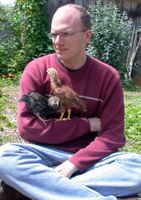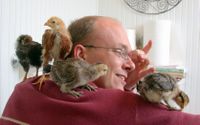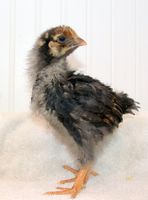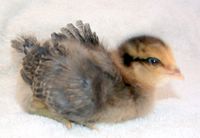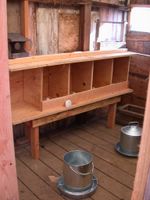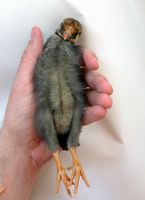Friday, April 29, 2005
Thursday, April 28, 2005

Good morning from Bess. Today when I lifted the screen off their brooder to feed them, all four of them immediately flew to the top of the brooder, the youngest ones coming first and then the older ones. That's a first--usually the younger ones flutter around and squawk but don't actually make it out.
Wednesday, April 27, 2005
Update on the brooder situation
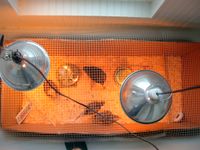
They've been on pine shavings for several days now (they were on newspaper covered in paper towels for the first 2-3 weeks of their lives) and although they do still nibble at the shavings, their little digestive systems seem to be in working order and the whole thing is so much easier to keep clean--basically, they bury their droppings and we add a little fresh shavings every now and then. We used two lights to deal with the possibility of a draft on cold nights, but that's not going to be necessary pretty soon, either.
Tuesday, April 26, 2005
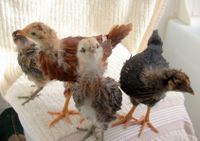
It is increasingly difficult to get all of them together for a group photo now that they are able to fly off under their own power. Left to right: Bess, Eleanor, Dolley, Abigail. Bess & Dolley, the Araucanas, are 3 weeks old, and Eleanor (Rhode Island Red) and Abigail (Golden Laced Wyandotte) are 4 weeks old.
Monday, April 25, 2005
Security Measures Complete
We're big believers in redundant systems around this house. So we have secured the run and the henhouse against evildoers, and even made it harder for said evildoers to get into the other half of the shed that is not henhouse territory. But no, that's not enough. We've built a box inside the henhouse where they will sleep at night. (actually, we just enclosed the nesting boxes we'd already built and added a couple latches.) Short of installing a security alarm or an electric fence, I think we've done all we can. The nice thing about this redundant system is that if we think we might be out late, for instance, we can lock them in the run & henhouse area and let them put themselves to bed in The Vault, knowing that they are already in a quite secure structure. Then when we get home, we can just come out and latch The Vault closed for even more safety.
Helpful hint for those of you considering building a coop: Unless you are much handier than we are, enjoy little construction projects more than we do, and have a ready supply of lumber, nails, tools, etc. already on hand, you can probably buy something for about the same price as you can build it, and it'll be a better thought-out design, too. Our feed store has metal or wood nesting boxes for $20 (we built our own, and it turns out to be surprisingly difficult to build a box), and they have a nice little "chicken tractor" style coop--an enclosed run and little box to lock them up at night--for about $450. You'd still need a way to prevent critters from burrowing under and a few other enhancements, but it's basically done. We also really like the highly portable Caboodle that a guy in Fort Bragg makes--a wine barrel on wheels, with a roost and nesting box inside. Just park it anywhere in the garden and lock them inside at night. Cost is about $775, but if you live nearby he delivers and gives you two hand-raised Ameraucana pullets to put in it, feeders & food, plus "technical support" via e-mail and phone. (and there are cheaper options if you don't want the personal delivery and chickens included) Sounds like a pretty good deal to me, especially for city chickens in small backyards.

The new, improved henhouse--it's still screened in, with chicken wire or hardware cloth buried all around the perimeter, and now it has a concrete floor where the dirt floor was before (on the right.) You'd think that would be enough to protect our girls, but oh, no. The shed itself is so ramshackle that we felt that it would only be a matter of time before a board fell loose or a piece of roofing came apart or something happened to allow entry by determined varmits. So they'll be able to run around this henhouse and the adjacent run during the day and enjoy plenty of protection, but at night, they are going into The Vault, shown here in its closed position.

Here's The Vault when it's open. Two nesting boxes, a roost just long enough for four birds (they need 8-10 inches each and they like to snuggle), side ventilation, and a little room to move around. They'll spend the night in here and during the day it will be open so they can hop in and lay an egg.

Oh yeah, and did I mention that we've got two cats as well? You can see how excited they are at the prospect of four hens sharing the backyard with them. So far they show very little interest in what's going on in the bathroom. We hope to keep it that way. Once the chicks are bigger, we expect (based on what everyone's told us about hens and cats) that they will basically ignore each other.
Sunday, April 24, 2005
I Guess That's Why They Call Them Chicken.
We took the two older ones, Eleanor and Abigail, outside for the first time today. The idea is to gradually get them used to the garden and even to their coop before they have to live there. They are 3 1/2 weeks old and seem to have enough feathers to keep warm on a slightly breezy day. As you can see, their wild adventurous spirit really took over once they got outside.
Friday, April 22, 2005
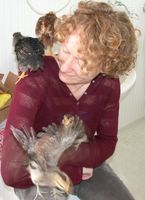
Dolley in flight. They are all quite into flying these days. They seem to think the purpose of flight is to get up into the air so they can drop straight down on one of their chick sisters. What a rude shock it will be for them when they get to be big fat hens who can't fly as much. Oh, well, that and the fact that I'll probably clip their wings. Another hen parenting debate: to clip or not to clip? Will clipping keep them from being able to escape predators, or prevent them from flying over the fence into the alley, where ravenous dogs await?
Thursday, April 21, 2005
The Perils of Poultry
There seem to be two schools of thought on raising backyard chickens: There's the "small flock management" approach, and the "raising chickens as beloved pets" approach.
If you're sort of a homesteader type raising a small flock for eggs and meat, these birds are not your pets and the instructions you get on how to raise them include a sort of "you win some, you lose some" approach. Do this, do that, and sure, a few of them are going to die, so be sure you raise some extra. What I read into this attitude is "You know, this may not be the best advice on how to get all your chicks safely to adulthood, but it's the most expedient."
At first, I understood this approach. I figured we would name the birds, and of course we would do our best to take care of them, but I knew we might lose some so I was trying to be very pragmatic. In fact, Scott was leaning towards getting three birds, but I wanted to get four, figuring, "oh well, we might lose one, so this way we've got a back-up."
Then we brought the adorable little chicks home and of course they became our pets, and suddenly expediency was not our top priority. That leads to the second approach, "raising chickens as beloved pets." If you follow this approach, you raise them by hand with great care, study up on chick nutrition, worry over every little thing that goes into their greedy little beaks, monitor them constantly for signs of ailments, and build a palace with Fort Knox-like security to make sure that the varmits don't make off with one of your precious hens in the middle of the night. You also evaluate every piece of advice on chick-rearing to see whether it is eventually followed by, "Oh, and of course you can expect to lose a few." Well, we only have a few! So we expect to lose NONE!
In my view, there is not near enough reliable information on the "chicks as pets" approach. The people who write chicken books, even if they are trying to write a book on backyard flocks, tend to be Experts, which means that they are experienced farmers who are hardened to the realities of chicken life.
This is why I found this recent e-mail from Katy, who raised her hens from chicks last year, so helpful. I'm reprinting it in its entirety here. Thanks, Katy, for your words of wisdom and warning. I'll be out back with the barbed wire all afternoon.
"I think you guys are already way ahead of where we were when we first got our chickens. We got a little carried away and weren't cautious enough. We fell in love with all the different breeds and ordered our chicks from Murray McMurray Hatchery, and they require that you order a minimum of 25. So, we began by brooding 25 tiny day old chicks in our bathroom. A few were DOA-too weak to make the overnight journey, and many others died within the first two days. So, there were thirteen that survived. We named them all and obsessed over every little development. We converted an old shed in our backyard for their coop. A few weeks after they moved out to the coop, we began opening the coop door to let them out to explore and play in the sun. It was great-they would run around as a group and then stretch out on their sides with their wings spread and their legs straight out behind them-sunning themselves. They started taking dust baths immediately. Our first casualty was a little japanese bantam we named Sushi. A vulture of all things got her. I thought vultures only ate carrion. The vulture came back every day for the following three days-but we kept the chicks inside for awhile. We had only ordered one rooster, but they sexed some of the chicks incorrectly and we ended up with four cockerels. They were gorgeous, but too loud and aggressive (with us-not each other). We ended up giving three away for someone else to keep as pets on their farm-keeping just one-a little bantam Rhode Island Red that we named Ruby.
We have lost three hens to dogs. Dogs that live down the road from our house and got loose on several occasions. During the day, our chickens roam free. They stay within our backyard-and put themselves to bed in the coop every night (we close the door behind them). They are so happy with that freedom, but it makes them very vulnerable to daytime predators. The first time we lost one, we built a covered run off of their coop-but by then they were so accustomed to having the entire backyard and all of their favorite spots that they were absolutely miserable and just paced back and forth and "barked". I couldn't stand to see them so unhappy, so we let them out. We have flexible schedules and work from home a lot, so we try and keep an eye on them. We lost one to a hawk. Raptors are a problem. They don't necessarily strike often-but don't underestimate them. We naively thought that hawks couldn't possible bring down our largest Brahma hen. Every time we've lost a chicken, it has been more heart-breaking than the last. Each one truly has its own personality.
We have managed to save our chickens on three occasions. Once, I got to one of my hens moments after a hawk had struck-it was actually trying to carry her away. I thought she was already dead, but after about ten minutes, she stood up and began walking again. She had a tiny puncture wound, and was in shock for the rest of the day, but by the following day, she had recovered. One of the reasons we kept one rooster is that he keeps all of the hens together and will immediately begin honking and barking if anything goes wrong. He will also attack a predator-even though he doesn't stand a chance.
POSSUM-twice we have awoke in the middle of the night and rushed outside when we heard the chickens' distress calls. Both times it was a possum. We made it in time, but were humbled by our oversight-because we had missed two holes in the coop that were obviously large enough for a possum or raccoon to squeeze through. Possum are incredibly tenacious-you don't want to have to deal with killing one (unless you actually have a gun and can do it quickly-we didn't)-but they will come back again and again if they think they might succeed.
I think it's great that you guys are starting with just four hens-and that you are handling them a lot so that they will be tame. We regret that we didn't do this more when ours were babies because now all but one of them are nearly impossible to catch. They are comfortable standing right next to us and eating out of our hands, but as soon as we reach for them, they panic and run. This has made it very difficult for us to round them up once we've let them out for the day. If we see too many hawks hanging around and want to get them back in their coop where it's safe-it isn't easy. If I were to start all over, I would have waited until we could afford the time and money to build them a very nice, very spacious, grassy run attached to their coop-so that they could still have the benefit of sun and shade, fresh bugs and greens-but safe from dogs and raptors.
Anyway, sorry for the very long-winded answer! Your chickens are obviously in very capable hands and can live a long, happy life.
Best, Katy"
Tuesday, April 19, 2005
Monday, April 18, 2005
Sunday, April 17, 2005
Coop Security Measures Continue
Anchored chicken wire around the back side of the coop today. Only one more side to do. So far, it has worked--the critter dug its way out of the coop but has not been able to dig its way back in. Cat food left inside the coop as bait is untouched.
In spite of the latest round of security measures, we are still thinking of building a box inside the coop to lock them in at night. It just seems that if a raccoon or possum had nothing better to do, night after night, it would eventually get in our dilapidated old shed. And if I came out one morning to a scene of carnage, it would absolutely break my heart.
Today at the pet store I tried to talk Scott into buying some toys for the girls. Little silly bird toys of some kind. He's more interested in giving them straw, grass, wadded up bits of paper, and so forth. It is true that just about any little bit of debris makes a great toy for them. One of them picks it up in her beak and starts running, and the rest of them chase after her. It's a little like soccer, all of them running from one end to the other.
Saturday, April 16, 2005
Friday, April 15, 2005
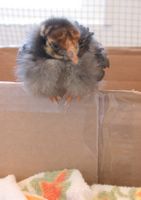
Abigail perched on the edge of the brooder. When we get the chicks out to play with them, the other three come out quite readily, but Abigail flaps around and runs away from us as if she doesn't want to leave her box. So we leave her in there, and as soon as she realizes she's alone, she starts in with that pitiful cheeping. Then, a few seconds later, we hear a flap of wings and she appears just like this, ready to join us after all.
Department of Homeland Security
We've taken the first steps towards making the coop more secure. Last night I put more cat food in the coop and locked it up. However, I think the possum spent the night in the coop, becauase in the morning, I could not find anyplace where it might have gotten in, but some of the food was eaten, the dirt inside the coop was all dug up, and there was other--ahem--evidence of an animal presence. We'll leave everything open tonight and hope he leaves. Otherwise, I suppose we'll have to consider more drastic measures (adopting a mountain lion? I'm not sure what the next step would be in this arms race.)
Thursday, April 14, 2005
What did the President know, and when did he know it?
There's been a break-in at the Democratic National Headquarters in our backyard. We knew that our coop, which occupies half of the old shed out back, might have some security flaws, so to test it, we put some cat food in a plastic pot as bait and locked it inside the coop.
Sure enough, someone (we'll call him McCord) broke in twice--once last night and once the night before--and got the food. We're not sure whether the culprit is a raccoon, a skunk, or a possum, but judging from the burrowing action, I'm guessing possum. Had we looked out the window, we might have seen some flashlights moving around in the shed. We also could have captured this on video surveillance, but unfortunately, there is an 18 1/2 minute gap in the recording. We're bringing Haldeman in for questioning.
Now we've got another big construction project on our hands, with the chicks about 6 weeks away from moving outdoors. Not sure yet what the solution will be. The Senate hearings will begin soon. We'll keep you posted. Below is the timeline of events as best we've been able to determine.
Wednesday, April 13, 2005
Tummy Time
We've been turning the chicks over on their backs from time to time just to get them used to being handled all over, with the hope that when they are adults, it'll be easier to check them out if they seem injured or sick.
Also, it's very amusing to turn them over on their backs. Here are photos of three of them. Not sure how Bess missed getting her photo taken this time.













